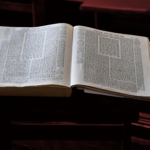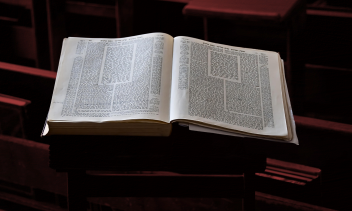There is circularity that underlies nearly all of rabbinic law. Open up the first page of Talmud and it already assumes that you read the rest of the book. As frustrating as that can be, the circularity of rabbinic law is even more vexing. At the heart of the Talmud is the question of rabbinic authority. Let’s assume for a moment that the Bible was delivered directly from Moshe (Moses) on Mount Sinai. But who invested the rabbis with the authority to interpret and develop the laws that line the pages of the Talmud?
There are two typical forms of answers and both rely on some seemingly circular reasoning. The first approach minimizes the rabbinic contribution and emphasizes that the core of rabbinic law derived from God at Sinai. The rabbis are merely putting to paper what God said to Moshe. There are plenty of texts in the Talmud that emphasize this point of view. Moshe received everything (see Talmud Berachot 5a). Even contemporary ideas of Torah were first given to Moshe at Sinai (Talmud Megilah 19b). This approach can be deeply unsatisfying, and more importantly, not necessarily correct. You’re left with the question as to why so little reference to any oral tradition exists in the written Torah. Some consider the very ambiguity of the Written Law as a proof for the existence of an oral tradition. Surely, all of the contradiction and ambiguity in the Torah point to some secondary more explanatory tradition. Personally, I never found that quite satisfying. It seems like it is more of a question about the composition of the written Torah, than an indication of the existence of an oral tradition. If I read an ambiguous passage in a book, would I immediately assume that there is a reader’s companion?
There is a second approach. The second approach begins with the premise that much of the Oral Law was in fact developed by rabbis. This approach also leaves the reader with questions. If rabbis contributed so significantly to the interpretation of the Torah, why should I listen to them? And who gave them such power? Such questions also lead to a different circulatory of sorts. While the Torah does give express authority to the High Court, known as the Sanhedrin, it is only later rabbinic texts that invest such power in later rabbinic authorities. A skeptic is certainly not going to rely on rabbis to interpret their own rabbinic authority. When a child asks a parent who made them the boss, should we listen to them when they say themselves?
These are difficult questions that are hard to express without a measure of irreverence. The question in most ways is easier to articulate than the answer. “Who gave you the right,” is easier to express than the long-storied history of the rabbinic contribution to Jewish law. Proceeding without acknowledging the dissonance between the ease of the question and the complexity of the answer would be disingenuous at best.
There are whole books and countless articles written to address this question, which isn’t surprising considering the question of the authority of rabbinic law is not a new one. It was articulated by the Karaites, it appears in the Talmud, and it later became common during the Enlightenment. Some approach the question historically by documenting the different strands and schools of interpretation that have existed throughout time. Others approach the question more legally, focusing instead on the legal philosophy underpinning the development of the Oral Law. Both are included in the further readings.
Instead of trying to point to a verse that underlies all of rabbinic law, it may be more sensible to ask why such a system was set up in the first place.
It is nearly impossible to extricate oneself from the circularity of the issue. It may be impossible to find a satisfying verse in the Torah to pin the corpus of Written Law. The question is magnified since rabbis instituted a blessing on rabbinic enactments that include the language “Blessed are you God who commanded us…” How can one say God commanded us to follow commandments that were instituted by Rabbis? The Talmud provides two verses:
מאי מברך מברך אשר קדשנו במצותיו וצונו להדליק נר של חנוכה והיכן צונו רב אויא אמר מלא תסור רב נחמיה אמר שאל אביך ויגדך זקניך ויאמרו לך
And what blessing does one recite? He recites: Who has made us holy through His commandments and has commanded us to light the Hanukkah light. The Gemara asks: And where did He command us? The mitzvah of Chanukah is not mentioned in the Torah, so how is it possible to say that it was commanded to us by God? The Gemara answers that Rav Avya said: The obligation to recite this blessing is derived from the verse: “You shall not turn aside from the sentence which they shall declare unto you, to the right, nor to the left” (Deuteronomy 17:11). From this verse, the mitzvah incumbent upon all of Israel to heed the statements and decrees of the Sages is derived. Therefore, one who fulfills their directives fulfills a divine commandment. Rav Neḥemya said that the mitzvah to heed the voice of the Elders of Israel is derived from the verse: “Ask your father, and he will declare unto you, your Elders, and they will tell you” (Deuteronomy 32:7).
If that’s not enough to convince, it is hard to lay blame. In many ways, you will always be left with the same circularity: relying on rabbinic texts to bolster the authority of rabbinic law.
Instead, we may be asking the wrong question. Instead of trying to point to a verse that underlies all of rabbinic law, it may be more sensible to ask why such a system was set up in the first place. Meaning, why do we have a system with an ambiguous written Torah and a rabbinic law that emerges from their analysis? Why wasn’t the Torah written more clearly? And why is the system of Jewish law and the Talmud set up in such a way that we have to rely so much on rabbinic interpretation?
What follows are three conversations—each connected to different aspects of the Talmud. Taken separately, they are certainly all interesting, but cumulatively, they begin to piece together a picture of the uniqueness of the Talmud.
More important than any one conversation, or even their collective conversations, is the totality of their work. I’ve highlighted some key works and questions that they each discuss on this subject as some further readings for those interested.
Hope you enjoy and keep the conversation going!
Listen in to our introductory episode for Talmud.








